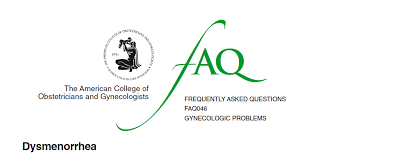I have been looking up information on endometriosis for a friend of mine, and came upon this from the American College of Obstetricians and Gynecologists:
I have been looking up information on endometriosis for a friend of mine, and came upon this from the American College of Obstetricians and Gynecologists:
So I bit and started reading. And about half way through my reading it I realized that this really reminds me of how they taught literature in the my native USSR. The teaching consisted of stock interpretations of the great authors’ works through the prism of Communist Party propaganda. In this interpretation all of the writers’ messages railed against the monarchy, and all exhortations were for the purpose of freeing the proletariat. No teacher ever dared to disagree, and no student was expected to question.
Why, you ask, do these ACOG FAQs on dysmenorrhea remind me of my schooling in the old country? Well, glad you asked. Check out this gem, for example:
That’s it. No follow-up questions? Good!
But really let’s take it from the top. So, OK, there is the pelvic exam. I can deal with that because I am used to that as the default for anything going on “down there.” Then there is the ultrasounds exam. I guess I can deal with that too because there has been so much in the news about pelvic ultrasound, and that seems to be what is done to get a better look at what is down there. A laparoscopy? Wait, isn’t that a surgical procedure? Yeah, they even say it’s a surgery, and it’s done to get a “look inside the pelvic region.” Hmmm, this sounds pretty serious. How come they don’t say anything here, in these FAQs, about what they are looking for, how good this surgery is at finding it, what the chances that what they find is responsible for my dysmenorrhea, what is the treatment and how successful it is at alleviating my symptoms of dysmenorrhea, and whether or not there are alternative interventions?
(Does anyone really ask the patients what their FAQs are or are they generated by the clinicians based on what they think should be important to the patient? Or even worse, based on what they think they can give a perfunctory answer to? Just from reading these Qs and As I think it’s the latter.)
You get my point. This formulation of information is beyond useless. It seems paternalistic in its “there there, dear, we will take care of everything” attitude. Perhaps I am out of touch. Perhaps women, patients in general, don’t want to go beyond what their doctor tells them to do. But I happen to think that it is these FAQs that are out of touch. Granted, I am a “difficult” patient, as even a pelvic exam, let alone ultrasound and surgery, meets with questions around the evidence of its effectiveness. But even if you have only completed ePatient 101, you should know enough to ask about something as serious as a laparoscopy! How can anyone be expected to just acquiesce and, sighing, say “yes, I guess I have to have surgery.” This “FAQ” is completely absurd in its willful lack of useful information. And if you read the rest of the document, you will find many places where this is true as well.
I know that some of you will read this and click away saying “oh, there she goes again.” But I think you need to rethink your apathy. After all, there are well over 200,000 deaths (and possibly even more than 400,000) annually in the US that happen unnecessarily just from contact with our “healthcare” system. If you can avoid the avoidable, is it not incumbent upon you to be fully informed? You may think that all these recommendations are evidence-based, and there is not a whole lot of wiggle room in how to proceed. Well you are wrong if you think so, since the evidence, even when it is available, is rarely, if ever, unequivocal. And furthermore, in medicine no benefit comes without a risk. Are you sure you want your doctor to make these decisions for you? How is it that people who are not even willing to take wardrobe advice from their mothers wade so enthusiastically into these high-risk medical adventures with their eyes and ears closed?
I wrote Between the Lines to show just how imprecise and uncertain the science of clinical medicine is. But beyond that, I wanted to provide you with tools at least to ask the right questions. So, please, go and ask. And insist that you be included in the FAQ processes. Otherwise, we are just wasting terabytes on propaganda.
If you like Healthcare, etc., please consider a donation (button in the right margin) to support development of this content. But just to be clear, it is not tax-deductible, as we do not have a non-profit status. Thank you for your support!









